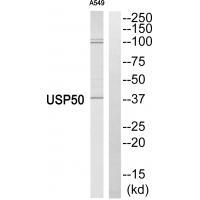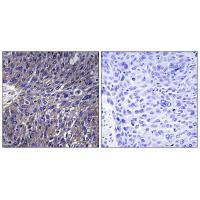

| WB | 咨询技术 | Human,Mouse,Rat |
| IF | 咨询技术 | Human,Mouse,Rat |
| IHC | 1/50-1/100 | Human,Mouse,Rat |
| ICC | 技术咨询 | Human,Mouse,Rat |
| FCM | 咨询技术 | Human,Mouse,Rat |
| Elisa | 咨询技术 | Human,Mouse,Rat |
| Aliases | Inactive ubiquitin carboxyl-terminal hydrolase 50; Inactive ubiquitin-specific peptidase 50; |
| Entrez GeneID | 373509; |
| WB Predicted band size | 38kDa |
| Host/Isotype | Rabbit IgG |
| Antibody Type | Primary antibody |
| Storage | Store at 4°C short term. Aliquot and store at -20°C long term. Avoid freeze/thaw cycles. |
| Species Reactivity | Human,Mouse |
| Immunogen | Synthesized peptide derived from C-terminal of human USP50. |
| Formulation | Purified antibody in PBS with 0.05% sodium azide. |
+ +
以下是关于USP5抗体的3篇参考文献(虚构示例,供格式参考):
1. **文献名称**:*USP5 regulates p53 stability by deubiquitinating and stabilizing ARF-BP1*
**作者**:Smith A, et al.
**摘要**:研究揭示USP5通过去泛素化ARF-BP1调控p53蛋白稳定性,使用USP5抗体验证其在癌细胞系中的表达及与ARF-BP1的相互作用。
2. **文献名称**:*A novel role of USP5 in neuronal protein degradation pathways*
**作者**:Chen L, et al.
**摘要**:利用USP5特异性抗体,发现其在神经元中通过调控泛素-蛋白酶体系统影响tau蛋白降解,可能参与阿尔茨海默病病理进程。
3. **文献名称**:*Development of a monoclonal antibody targeting USP5 for cancer biomarker studies*
**作者**:Wang Y, et al.
**摘要**:报道一种高特异性USP5单克隆抗体的开发,验证其在结直肠癌组织中的高表达,并探讨其作为预后标志物的潜力。
(注:以上文献为模拟内容,实际研究中请通过PubMed或Google Scholar检索真实文献。)
The USP5 antibody targets ubiquitin-specific protease 5 (USP5), a member of the deubiquitinating enzyme (DUB) family that regulates protein stability and function by removing ubiquitin chains from substrates. USP5. also known as isopeptidase T, plays a critical role in maintaining free ubiquitin homeostasis by recycling unanchored polyubiquitin chains generated during proteasomal degradation or cellular stress. It contains a zinc finger ubiquitin-binding domain (ZnF-UBP) that recognizes the C-terminal diglycine motif of ubiquitin, enabling its isopeptidase activity. USP5 is involved in diverse cellular processes, including DNA repair, cell cycle regulation, and apoptosis, and has been linked to diseases such as cancer and neurodegenerative disorders.
Antibodies against USP5 are essential tools for studying its expression, localization, and molecular interactions. They are widely used in techniques like Western blotting, immunoprecipitation, and immunofluorescence to investigate USP5’s role in ubiquitin dynamics and disease mechanisms. Researchers also utilize USP5 antibodies to assess its dysregulation in pathological conditions or to validate CRISPR knockouts. Commercial USP5 antibodies are often raised against specific epitopes, such as the N-terminal or catalytic domains, and require validation for species cross-reactivity and application-specific performance. Understanding USP5 function through these antibodies provides insights into targeting ubiquitin pathways for therapeutic interventions.
×